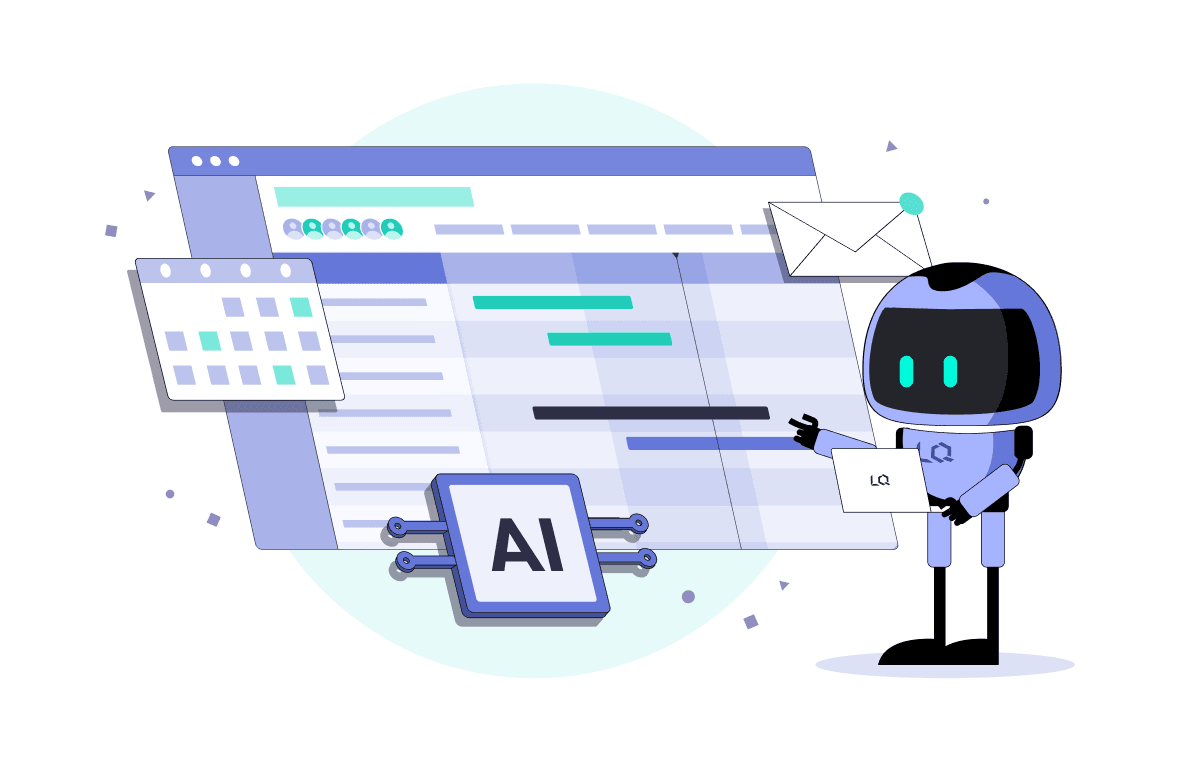Updated Dec 18, 2024 8 min read
How to Use Your Product Management Experience to Ride the AI Wave
Product managers can open new doors for creativity, efficiency, and growth by embracing AI and incorporating it into their product management methods. To stay ahead of the curve in the rapidly evolving world of technology, it is crucial to comprehend how to leverage product management expertise to ride the AI wave.

Product Management in the AI Era
Product managers are ideally situated to use their experience and talents to navigate this new era of technology as AI continues to transform the corporate landscape. Product managers can open new doors for creativity, efficiency, and growth by embracing AI and incorporating it into their product management methods. To stay ahead of the curve in the rapidly evolving world of technology, it is crucial to comprehend how to leverage product management expertise to ride the AI wave.
Nevertheless, before we get into how AI might be used to streamline procedures, let's address a common concern.
Can Product Manager AI replace Product Managers?
The short answer is actually yes. In theory, product managers could be replaced by some type of artificial intelligence (AI). But such a type that would cover all the functions of a product manager does not yet exist. AI-powered product management has grown in popularity in recent years, leaving AI-driven software more sophisticated and capable of handling vast amounts of data more efficiently. So some aspects can be noted now, but you can't call it a replacement - it's more of a help.
What Exactly Is AI?
AI stands for Artificial Intelligence. It refers to the creation of computer systems capable of performing activities that need human intelligence, such as visual perception, speech recognition, decision-making, and natural language processing.
There are several forms of AI, ranging from basic rule-based systems to complex neural networks. Different types of AI exist, ranging from basic rule-based systems to more advanced machine learning and deep learning models. Rule-based systems make judgments based on pre-defined rules, whereas machine learning models are trained on massive datasets to discover patterns and make predictions. Deep learning models use neural networks to learn from data and make decisions based on that learning.
Revolutionary AI Chatbot Powered by Machine Learning
Machine Learning for Product Managers – a subset of AI used to build models from existing sets of data to predict future outcomes.
That’s why ChatGPT — the GPT stands for generative pre-trained transformer — is receiving so much attention right now. It is a free chatbot that can generate an answer to almost any question it is asked. Developed by OpenAI and released for testing to the general public in November 2022, it’s already considered the best AI chatbot ever.
The Relevance of AI Implementation
In picture 1, you can see that since 2017, the use of artificial intelligence by companies has doubled. And judging by how popular ChatGPT has gained lately next year, we should expect even bigger numbers. But how can you keep up with the trends of the new world and use AI for managementin your projects? Read below.

What Can Artificial Intelligence Do for Managers?
AI is capable of a wide range of tasks that can help to improve and streamline product management and development. Here are a few examples:
Data analytics and market intelligence: AI is best suited for processing and analyzing vast volumes of data from multiple sources at this point of development. Processing client feedback, sales data, and market trends are all part of it. AI is also feasible to recognize trends and develop suggestions for new projects as well as enhance existing ones.
Expected result analytics: Using machine learning algorithms, AI can forecast future market trends and customer behavior patterns. When a product manager decides on a plan, this feature is plainly obvious.
Quality Assurance: AI can also successfully control product quality by detecting software problems and evaluating performance indicators.
Personalization: AI excels in automated customization, which is popular in many sectors. Product recommendations and user interfaces will aid in the creation of individualized customer experiences.
Work Automation: AI may automate routine operations and workflows. This approach will free up the resources of product managers to focus on more strategic and creative duties.
As you can see, there are several methods for incorporating artificial intelligence into your work. Nonetheless, this brings us to the conclusion that the most astounding productivity is reached through a mix of human and AI knowledge, as AI is presently incapable of replacing human intuition and experience.
Critical Aspects of Replacing a Product Manager with a Machine Learning Product Manager and Why It Is Not Possible
It is important to note that AI can't replace the human touch just yet. Product managers bring a wealth of knowledge and experience that no AI can accurately replicate. Product managers are responsible for a variety of tasks, including making decisions, planning and executing strategy, creating product roadmaps, and managing customer relationships. AI is still not able to make decisions and think creatively the way a human can.
Product managers often have to work with teams and stakeholders, something that AI still needs to improve at. AI-driven software can help with data analysis and management but cannot replicate the human touch when building relationships and connecting with customers. In the work of a project manager, it is crucial to demonstrate many soft skills. The behavior of people and the atmosphere in the team depend on many decisions and reactions to them. Understanding these processes often takes place on a subconscious and emotional level, which only a person is capable of.
Additionally, procurement process flow is another critical area where human expertise shines. A structured procurement process flow requires a nuanced understanding of vendor relationships, negotiation tactics, and the ability to align purchasing decisions with organizational goals—tasks AI is not yet equipped to manage without human oversight.
Finally, product managers are often the ones who can see the big picture and provide a unique insight into the product. AI simply can't match the skills and experience necessary to do this effectively.
Machine Learning Product Management Instruments
- AI in Management Software: these tools help automate tasks, predict risks, and monitor project progress. Examples of AI-powered project management software are Asana, Trello, and Monday.com.
- Chatbots: can help project managers solve administrative issues, remind them of deadlines and tasks, and help with API integration companies. Examples of AI-powered chatbots are Tars, BotStar, and Landbot.
- Natural Language Processing (NLP): Project managers can benefit from NLP by using it to analyze text data, including project reports, customer reviews, and comments on social media. Project managers can use NLP to find patterns, attitudes, and insights to help them make decisions. Examples of NLP tools are Google Cloud Natural Language API, IBM Watson NLP, and SpaCy.
- Predictive analytics: Project managers can foresee project results, spot potential dangers, and allocate resources more efficiently with the aid of predictive analytics. Examples of predictive analytics tools are Microsoft Azure Machine Learning, Google Cloud AI Platform, and Amazon SageMaker.
- Intelligent scheduling: Project managers can manage resources, optimize scheduling, and resolve problems with the use of AI-powered scheduling software. Examples of intelligent scheduling tools are X.ai, Calendly, and Acuity Scheduling. Microsoft AI can also be attributed to this type, in their Microsoft Teams application there is an artificial intelligence function that will document the entire conversation, this function will save you time and help with set tasks.
Great Example of Implementation Management AI
In 2016, the French telecommunications company Orange implemented a chatbot powered by an AI language model to handle customer service inquiries on its website. The chatbot was able to answer over 10,000 customer inquiries per day, with an accuracy rate of over 80%. It not only improved response times but also freed up human agents to handle more complex inquiries and issues. It is an example of how AI product management decisions can increase company results and simplify processes using AI technology for the daily work of other teammates.
For clarity, pay attention to picture 2, where you can see in which areas, businesses, and projects artificial intelligence is actively used.

How API and AI Are Linked
APIs allow AI (Artificial Intelligence) systems to communicate with other applications or services (Application Programming Interfaces). APIs, which provide a standardized and secure interface, can be used to integrate AI models with other systems or data sources.
AI models, for example, might be used to recognize and evaluate pictures. This model might be made available through an API so that other applications may use it to transmit photographs for analysis. The API would provide an easy-to-use interface for providing the image to the AI model, obtaining the results, and optionally performing extra actions in reaction to the results (e.g. updating a database, sending a notification, etc.).
APIs can also be used to build AI systems. Many well-known AI systems and libraries, such as TensorFlow and PyTorch, provide APIs that allow programmers to train their own models. These APIs enable developers to concentrate on higher-level concepts and use cases by abstracting away many low-level intricacies of interacting with complicated AI algorithms.
Conclusion
So, AI has great potential to revolutionize product management by streamlining processes, improving decision-making, and identifying new opportunities. However, it is important to recognize that AI is not a substitute for human experience, soft skills, and intuition. While AI can certainly help with product management tasks such as data analysis and forecasting, it cannot replicate the invaluable understanding of human behavior and expertise that product managers bring. Ultimately, the combination of artificial intelligence and the human touch will likely be the most effective approach to product management in the coming years.
Comments
There are no comments yet. Be the first one to share your opinion!
For 8 years, we have helped more than 200+ companies to create a really high-quality product for the needs of customers.
- Quick Start
- Free Trial
- Top-Notch Technologies
- Hire One - Get A Full Team
Was this article helpful to you?
Looking for reliable Software Testing company?
Let's make a quality product! Tell us about your project, and we will prepare an individual solution.
FAQ
The AI Wave refers to the rapid adoption and integration of artificial intelligence (AI) technologies across various industries and sectors. It signifies the transformative impact of AI on business, products, and the broader economy.
Product managers play a crucial role in shaping the direction, features, and success of AI-powered products. They use their expertise to bridge the gap between technical AI teams and the business side, ensuring that AI solutions are both technically feasible and aligned with market needs.
Engage with AI communities, attend conferences, subscribe to AI-focused publications, and consider taking online courses or certifications to deepen your understanding.
Yes, ethical considerations are paramount. Issues like data privacy, bias in AI models, and transparency should always be at the forefront of product development.
While many principles remain the same, AI product management often involves unique challenges related to data management, algorithmic fairness, and the interpretability of models. It requires a blend of technical understanding and traditional product strategy.




